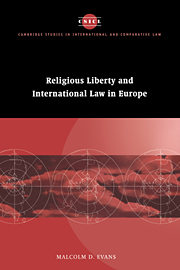Book contents
- Frontmatter
- Contents
- Acknowledgments
- Chronological table of international treaties
- Table of cases
- List of abbreviations
- Introduction
- 1 Early antecedents
- 2 From Augsburg to Paris
- 3 The League of Nations: drafting the Covenant
- 4 The Polish Minorities Treaty
- 5 The extension of the minorities system
- 6 The experience under the League
- 7 The UN system
- 8 Article 18 of the International Covenant on Civil and Political Rights
- 9 The 1981 Declaration on the Elimination of All Forms of Intolerance and of Discrimination Based on Religion or Belief
- 10 Religious freedom under the European Convention on Human Rights: the drafting of Article 9 and of Article 2 of the First Protocol
- 11 The application of Article 9 of the European Convention on Human Rights
- 12 Restrictions upon the scope of Article 9(1)
- 13 The application of Article 2 of the First Protocol
- 14 An interim conclusion
- Bibliography
- Index
- CAMBRIDGE STUDIES IN INTERNATIONAL AND COMPARATIVE LAW
1 - Early antecedents
Published online by Cambridge University Press: 06 January 2010
- Frontmatter
- Contents
- Acknowledgments
- Chronological table of international treaties
- Table of cases
- List of abbreviations
- Introduction
- 1 Early antecedents
- 2 From Augsburg to Paris
- 3 The League of Nations: drafting the Covenant
- 4 The Polish Minorities Treaty
- 5 The extension of the minorities system
- 6 The experience under the League
- 7 The UN system
- 8 Article 18 of the International Covenant on Civil and Political Rights
- 9 The 1981 Declaration on the Elimination of All Forms of Intolerance and of Discrimination Based on Religion or Belief
- 10 Religious freedom under the European Convention on Human Rights: the drafting of Article 9 and of Article 2 of the First Protocol
- 11 The application of Article 9 of the European Convention on Human Rights
- 12 Restrictions upon the scope of Article 9(1)
- 13 The application of Article 2 of the First Protocol
- 14 An interim conclusion
- Bibliography
- Index
- CAMBRIDGE STUDIES IN INTERNATIONAL AND COMPARATIVE LAW
Summary
The Ancient Near East
The idea that a State ought to tolerate the religious beliefs and practices of other communities would have appeared irrational to early civilizations. From earliest times, the institutions of what might be called ‘secular’ authority were so closely interwoven with religious authority as to be practically indistinguishable.
In Sumerian and Mesopotamian mythology, man was created in order to relieve the gods from the burdensome task of providing for themselves: men were created as the servants of the gods. This was also reflected in the Akkadian and Babylonian myths which have come down to us and which represent a continuation and transformation of the earlier Semitic material. It was also implicit within this understanding of the created order that each deity had its own particular dwelling place; and men living there were its servants. If the servants of one god (that is, the people of one city) fell under the sway of those of another, then this was perceived as having some connection with the relationship between the gods themselves. The physical destruction of a city or temple represented the final humiliation of the god.
The versions of the early creation myths that have come down to us reflect the shifts in political power between the warring powers of the region. The written version of the Babylonian creation myth derives from a period of Babylonian supremacy, so it is Bel-Marduk, the god of Babylon, who is invested with supremacy over the other gods of the region.
- Type
- Chapter
- Information
- Religious Liberty and International Law in Europe , pp. 6 - 41Publisher: Cambridge University PressPrint publication year: 1997

